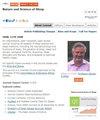急性睡眠不足对运动员运动表现的影响:全面系统回顾和元分析
IF 3
2区 医学
Q2 CLINICAL NEUROLOGY
引用次数: 0
摘要
研究目的本研究采用荟萃分析法全面、定量地评价急性睡眠不足对运动员不同运动表现的影响,旨在为教练员优化调整训练和比赛安排提供科学指导:制定文献纳入和排除标准,在中英文数据库中进行检索。使用 stata 14.0 分析了 27 篇收录文献中的 75 个指标,重点分析了急性睡眠不足对整体运动成绩的影响、对不同运动能力的运动成绩的影响以及急性睡眠不足后上下午运动成绩的差异等三个方面:急性睡眠不足对总体运动成绩的影响大小为-0.56(P< 0.05)。子分析表明,整夜剥夺睡眠的效应大小为-0.23(P< 0.05),夜末部分剥夺睡眠的效应大小为-1.17(P< 0.05),夜初部分剥夺睡眠的效应大小为-0.25(P> 0.05)。急性睡眠不足对高强度间歇运动、技能控制、速度、有氧耐力和爆发力指标的效应大小分别为-1.57、-1.06、-0.67、-0.54和-0.39(P< 0.05)。急性睡眠不足对上午和下午整体运动表现的影响大小分别为-0.30和-1.11(P< 0.05):结论:急性睡眠不足会严重影响运动员的整体运动表现,在晚间部分睡眠不足的情况下,负面影响更为明显。急性睡眠不足会对不同类型的运动表现产生不利影响,影响程度依次为高强度间歇运动、技能控制、速度、有氧耐力和爆发力。急性睡眠不足后,运动员下午的整体运动表现不如上午。关键词:急性睡眠不足;运动员;运动能力;运动表现;荟萃分析本文章由计算机程序翻译,如有差异,请以英文原文为准。
Effects of Acute Sleep Deprivation on Sporting Performance in Athletes: A Comprehensive Systematic Review and Meta-Analysis
Objective: Using meta-analysis to comprehensively and quantitatively evaluate the impact of acute sleep deprivation on different sports performance of athletes, this study aims to provide scientific guidance for coaches in optimizing and adjusting training and competition arrangements.
Methods: Establishing literature inclusion and exclusion criteria, we conducted searches in both Chinese and English databases. Using stata 14.0, we analyzed 75 indicators from 27 included literature, focusing on three aspects: the impact of acute sleep deprivation on overall athletic performance, the impact on sporting performance across various athletic abilities, and the disparities in athletic performance between morning and afternoon following acute sleep deprivation.
Results: The effect size of acute sleep deprivation on overall athletic performance was − 0.56 (P< 0.05). Sub-analyses revealed effect sizes of − 0.23 (P< 0.05) for whole night sleep deprivation, − 1.17 (P< 0.05) for partial sleep deprivation at the end of the night, and − 0.25 (P> 0.05) for partial sleep deprivation in the beginning of the night. The effect sizes of acute sleep deprivation on high intensity intermittent exercise, skill control, speed, aerobic endurance, and explosive power indicators were − 1.57, − 1.06, − 0.67, − 0.54, and − 0.39 respectively (P< 0.05). The effect sizes of acute sleep deprivation on the overall athletic performance in the morning and afternoon were − 0.30, and − 1.11, respectively (P< 0.05).
Conclusion: Acute sleep deprivation significantly impairs the overall athletic performance of athletes, with a more pronounced negative impact observed with partial sleep deprivation at the end of the night. Various types of exercise performance are adversely affected by acute sleep deprivation, with magnitude of impact ranking high intensity intermittent, skill control, speed, aerobic endurance, and explosive power. Following acute sleep deprivation, athletes’ overall sporting performance in the afternoon is inferior to that in the morning.
Keywords: acute sleep deprivation, athletes, athletic ability, sporting performance, meta-analysis
Methods: Establishing literature inclusion and exclusion criteria, we conducted searches in both Chinese and English databases. Using stata 14.0, we analyzed 75 indicators from 27 included literature, focusing on three aspects: the impact of acute sleep deprivation on overall athletic performance, the impact on sporting performance across various athletic abilities, and the disparities in athletic performance between morning and afternoon following acute sleep deprivation.
Results: The effect size of acute sleep deprivation on overall athletic performance was − 0.56 (P< 0.05). Sub-analyses revealed effect sizes of − 0.23 (P< 0.05) for whole night sleep deprivation, − 1.17 (P< 0.05) for partial sleep deprivation at the end of the night, and − 0.25 (P> 0.05) for partial sleep deprivation in the beginning of the night. The effect sizes of acute sleep deprivation on high intensity intermittent exercise, skill control, speed, aerobic endurance, and explosive power indicators were − 1.57, − 1.06, − 0.67, − 0.54, and − 0.39 respectively (P< 0.05). The effect sizes of acute sleep deprivation on the overall athletic performance in the morning and afternoon were − 0.30, and − 1.11, respectively (P< 0.05).
Conclusion: Acute sleep deprivation significantly impairs the overall athletic performance of athletes, with a more pronounced negative impact observed with partial sleep deprivation at the end of the night. Various types of exercise performance are adversely affected by acute sleep deprivation, with magnitude of impact ranking high intensity intermittent, skill control, speed, aerobic endurance, and explosive power. Following acute sleep deprivation, athletes’ overall sporting performance in the afternoon is inferior to that in the morning.
Keywords: acute sleep deprivation, athletes, athletic ability, sporting performance, meta-analysis
求助全文
通过发布文献求助,成功后即可免费获取论文全文。
去求助
来源期刊

Nature and Science of Sleep
Neuroscience-Behavioral Neuroscience
CiteScore
5.70
自引率
5.90%
发文量
245
审稿时长
16 weeks
期刊介绍:
Nature and Science of Sleep is an international, peer-reviewed, open access journal covering all aspects of sleep science and sleep medicine, including the neurophysiology and functions of sleep, the genetics of sleep, sleep and society, biological rhythms, dreaming, sleep disorders and therapy, and strategies to optimize healthy sleep.
Specific topics covered in the journal include:
The functions of sleep in humans and other animals
Physiological and neurophysiological changes with sleep
The genetics of sleep and sleep differences
The neurotransmitters, receptors and pathways involved in controlling both sleep and wakefulness
Behavioral and pharmacological interventions aimed at improving sleep, and improving wakefulness
Sleep changes with development and with age
Sleep and reproduction (e.g., changes across the menstrual cycle, with pregnancy and menopause)
The science and nature of dreams
Sleep disorders
Impact of sleep and sleep disorders on health, daytime function and quality of life
Sleep problems secondary to clinical disorders
Interaction of society with sleep (e.g., consequences of shift work, occupational health, public health)
The microbiome and sleep
Chronotherapy
Impact of circadian rhythms on sleep, physiology, cognition and health
Mechanisms controlling circadian rhythms, centrally and peripherally
Impact of circadian rhythm disruptions (including night shift work, jet lag and social jet lag) on sleep, physiology, cognition and health
Behavioral and pharmacological interventions aimed at reducing adverse effects of circadian-related sleep disruption
Assessment of technologies and biomarkers for measuring sleep and/or circadian rhythms
Epigenetic markers of sleep or circadian disruption.
 求助内容:
求助内容: 应助结果提醒方式:
应助结果提醒方式:


